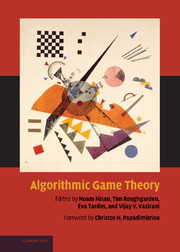Book contents
- Frontmatter
- Contents
- Foreword
- Preface
- Contributors
- I Computing in Games
- II Algorithmic Mechanism Design
- III Quantifying the Inefficiency of Equilibria
- IV Additional Topics
- 22 Incentives and Pricing in Communications Networks
- 23 Incentives in Peer-to-Peer Systems
- 24 Cascading Behavior in Networks: Algorithmic and Economic Issues
- 25 Incentives and Information Security
- 26 Computational Aspects of Prediction Markets
- 27 Manipulation-Resistant Reputation Systems
- 28 Sponsored Search Auctions
- 29 Computational Evolutionary Game Theory
- Index
23 - Incentives in Peer-to-Peer Systems
from IV - Additional Topics
Published online by Cambridge University Press: 31 January 2011
- Frontmatter
- Contents
- Foreword
- Preface
- Contributors
- I Computing in Games
- II Algorithmic Mechanism Design
- III Quantifying the Inefficiency of Equilibria
- IV Additional Topics
- 22 Incentives and Pricing in Communications Networks
- 23 Incentives in Peer-to-Peer Systems
- 24 Cascading Behavior in Networks: Algorithmic and Economic Issues
- 25 Incentives and Information Security
- 26 Computational Aspects of Prediction Markets
- 27 Manipulation-Resistant Reputation Systems
- 28 Sponsored Search Auctions
- 29 Computational Evolutionary Game Theory
- Index
Summary
Abstract
Peer-to-peer (p2p) systems support many diverse applications, ranging from file-sharing and distributed computation to overlay routing in support of anonymity, resiliency, and scalable multimedia streaming. Yet, they all share the same basic premise of voluntary resource contribution by the participating peers. Thus, the proper design of incentives is essential to induce cooperative behavior by the peers. With the increasing prevalence of p2p systems, we have not only concrete evidence of strategic behavior in large-scale distributed systems but also a live laboratory to validate potential solutions with real user populations. In this chapter we consider theoretical and practical incentive mechanisms, based on reputation, barter, and currency, to facilitate peer cooperation, as well as mechanisms based on contracts to overcome the problem of hidden actions.
Introduction
The public release of Napster in June 1999 and Gnutella in March 2000 introduced the world to the disruptive power of peer-to-peer (p2p) networking. Tens of millions of individuals spread across the world could now self-organize and collaborate in the dissemination and sharing of music and other content, legal or otherwise. Yet, within 6 months of its public release, and long before individual users are threatened by copyright infringement lawsuits, the Gnutella network saw two thirds of its users free-riding, i.e., downloading files from the network without uploading any in return.
Given the large-scale, high-turnover, and relative anonymity of the p2p file-sharing networks, most p2p transactions are one-shot interactions between strangers that will never meet again in the future.
- Type
- Chapter
- Information
- Algorithmic Game Theory , pp. 593 - 612Publisher: Cambridge University PressPrint publication year: 2007
- 12
- Cited by



